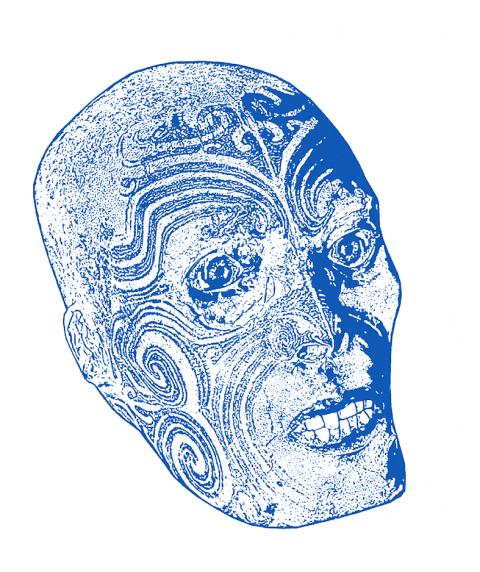The mummified and tattooed head of a Maori is returning to New Zealand after spending 136 years in a Normandy, France, museum, a belated gesture to restore dignity to the first of 16 such human heads once displayed as exotic curiosities.
The Rouen Museum tried once before, in 2007, to return the head, but was stopped at the last minute by the French Culture Ministry. France considers human remains conserved in museums to be among its cultural or scientific patrimony.
A symbolic handover ceremony went ahead in Rouen in 2007. Yesterday, it was to be the real thing, thanks to a law passed a year ago that allows Maori heads in France to be returned to their homelands.

Photo: AFP
An elaborate ceremony with incantations it to be held at Rouen City Hall during yesterday’s handover of the head to New Zealand diplomats.
For years, New Zealand has sought the return of Maori heads kept in collections abroad, many of which were obtained by Westerners in exchange for weapons and other goods.
Dozens of museums worldwide, though not all, have agreed to return them. Maori, the island nation’s indigenous people, believe their ancestors’ remains should be respected in their home area without being disturbed.
French Senator Catherine Morin-Desailly authored the bill to return the heads, which were then buried.
Some Maori heads, with intricate tattoos, were traditionally kept as trophies from tribal warfare. However, once Westerners began offering prized goods in exchange for them, men were in danger of being killed simply for their tattoos, French museum officials have said.
Little is known about how the Rouen Museum acquired a Maori head in 1875, offered by a Parisian named Drouet.
“It’s an enigma,” museum director Sebastien Minchin said, adding that neither Drouet’s full name nor profession is known.
Until 1996, when the museum was closed for a decade, the head was displayed with the prehistoric collection.
“As was done at the time, they compared the ‘savage’ from the other side of the world with our local cavemen,” Minchin said in a telephone interview.
When Minchin became director in 2006 and discovered the head, he said he had it stored because exposing it “could pose problems” for both the Maoris and the public.
More than a half-dozen countries have returned more than 300 Maori heads, according to a report to the French parliament on the question.
It was not immediately known if and when the 15 other Maori heads in France would be returned to New Zealand.
The heads are spread in museums from Paris to Marseille, with two heads at the Montpellier School of Medicine.
Minchin said that the problem goes beyond legal issues in France.
He said he was criticized for opening “Pandora’s box” when he first tried to return the head.
“There is a fear of emptying our museums,” he said. “There is a fear of restitution demands for other human remains and notably Egyptian mummies.”
France passed a special law before the 2002 return to South Africa of the skeleton and bottled organs of Saartjie Baartman, a 19th century African woman exhibited in Paris and London, sometimes in a cage, sometimes dressed in feathers, under the pejorative nickname “the Hottentot Venus.”

A Chinese scientist was arrested while arriving in the US at Detroit airport, the second case in days involving the alleged smuggling of biological material, authorities said on Monday. The scientist is accused of shipping biological material months ago to staff at a laboratory at the University of Michigan. The FBI, in a court filing, described it as material related to certain worms and requires a government permit. “The guidelines for importing biological materials into the US for research purposes are stringent, but clear, and actions like this undermine the legitimate work of other visiting scholars,” said John Nowak, who leads field

Swedish campaigner Greta Thunberg was deported from Israel yesterday, the Israeli Ministry of Foreign Affairs said, the day after the Israeli navy prevented her and a group of fellow pro-Palestinian activists from sailing to Gaza. Thunberg, 22, was put on a flight to France, the ministry said, adding that she would travel on to Sweden from there. Three other people who had been aboard the charity vessel also agreed to immediate repatriation. Eight other crew members are contesting their deportation order, Israeli rights group Adalah, which advised them, said in a statement. They are being held at a detention center ahead of a

‘THE RED LINE’: Colombian President Gustavo Petro promised a thorough probe into the attack on the senator, who had announced his presidential bid in March Colombian Senator Miguel Uribe Turbay, a possible candidate in the country’s presidential election next year, was shot and wounded at a campaign rally in Bogota on Saturday, authorities said. His conservative Democratic Center party released a statement calling it “an unacceptable act of violence.” The attack took place in a park in the Fontibon neighborhood when armed assailants shot him from behind, said the right-wing Democratic Center, which was the party of former Colombian president Alvaro Uribe. The men are not related. Images circulating on social media showed Uribe Turbay, 39, covered in blood being held by several people. The Santa Fe Foundation

NUCLEAR WARNING: Elites are carelessly fomenting fear and tensions between nuclear powers, perhaps because they have access to shelters, Tulsi Gabbard said After a trip to Hiroshima, US Director of National Intelligence Tulsi Gabbard on Tuesday warned that “warmongers” were pushing the world to the brink of nuclear war. Gabbard did not specify her concerns. Gabbard posted on social media a video of grisly footage from the world’s first nuclear attack and of her staring reflectively at the Hiroshima Peace Memorial. On Aug. 6, 1945, the US obliterated Hiroshima, killing 140,000 people in the explosion and by the end of the year from the uranium bomb’s effects. Three days later, a US plane dropped a plutonium bomb on Nagasaki, leaving abut 74,000 people dead by the